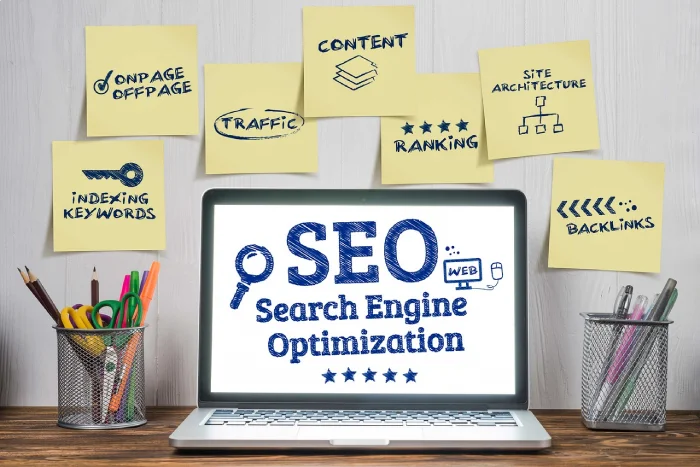The Role of Search Engine Optimisation in Digital Marketing
These days, businesses navigate a complex landscape to establish and amplify their online presence. At the core of this intricate web lies Search Engine Optimisation (SEO), a linchpin that shapes the success of digital marketing strategies.
This article unravels the significance of SEO within the broader context of digital marketing, exploring its intricacies, benefits of SEO in digital marketing, and seamless integration with diverse digital marketing strategies, including examples of SEO and insights into how SEO works in digital marketing.

Navigating the Digital Frontier: Unveiling the Multifaceted Landscape of Digital Marketing
Most businesses deploy a multifaceted approach to online promotion through the expansive realm of digital marketing. This intricate strategy extends across diverse channels and platforms, serving as a dynamic showcase for products and services.
By harnessing the power of search marketing, social media platforms, email, and websites, businesses actively strive to establish meaningful connections with their target audience in a world progressively dominated by digital interactions.
Crafting a Holistic Approach to Digital Engagement
The effectiveness of digital marketing lies in its holistic approach. It's not about singularly showcasing a product or service but crafting a narrative that seamlessly integrates across channels. A well-executed digital marketing strategy considers the user's journey, from the initial discovery through search engines to the engagement on social media and, finally, the personalised interaction through email.
The synergy of these elements creates a comprehensive brand experience that resonates with the audience at every touchpoint. In an era where digital interactions shape consumer decisions, understanding the nuances of digital marketing is not merely an option for businesses; it is a strategic imperative to navigate the intricacies of a consumer landscape increasingly defined by online interactions.
SEO Mastery in Digital Marketing: Orchestrating Online Visibility
At its core, SEO is a meticulous art involving the strategic optimisation of a website's elements — from content and structure to meta tags — harmonising them with search engine algorithms to secure a coveted position on search engine results pages (SERPs).
This dance of optimisation ensures a prominent presence on the digital stage and aligns seamlessly with the broader panorama of digital marketing, where SEO stands as a guiding force, steering strategies towards enhanced visibility and unparalleled user engagement.
Elevating Strategies through SEO Precision
SEO is not merely a technical endeavour. It is a strategic catalyst that propels digital marketing strategies to new heights. Beyond the intricacies of keywords and algorithms, SEO encapsulates a holistic approach that resonates with the dynamic preferences of modern consumers. It is the fine-tuning of a website's DNA, ensuring it speaks the language of search engines while delivering value to the audience.

By strategically placing keywords, optimising meta tags, and enhancing overall site structure, SEO sets the stage for a compelling online presence that transcends mere visibility — it cultivates an immersive user experience.
In the grand theatre of digital marketing, where user engagement is paramount, SEO takes centre stage as the choreographer who attracts the spotlight and ensures the audience stays captivated through every step of the online journey.
Importance of SEO in Digital Marketing
The importance of SEO in digital marketing cannot be overstated. At its core, SEO catalyses enhancing a brand's online visibility, making it more accessible to target audiences. The process involves optimising various elements, such as keywords, meta tags, and content, to align with the algorithms of search engines.
As a result, businesses that invest in SEO are more likely to appear prominently in search results, increasing the chances of attracting organic search traffic.
One of the significant benefits of SEO in digital marketing lies in its ability to drive traffic to websites. Unlike paid advertising, which requires continuous investment, organic traffic generated through SEO is sustainable over the long term. By consistently ranking high on search engine results, businesses can enjoy a steady stream of visitors who actively search for relevant products or services.
Furthermore, SEO contributes to the credibility and trustworthiness of a brand. Users often associate higher search rankings with authority and reliability. As a result, businesses that appear on the top results are more likely to be perceived positively by consumers. This aspect is crucial in building a brand reputation and establishing a strong online presence.
In addition to these benefits, SEO plays a vital role in improving user experience. By optimising website elements such as page speed, mobile responsiveness, and user-friendly navigation, businesses can create a positive online experience for visitors. This, in turn, contributes to higher retention rates and increased user satisfaction, further enhancing the overall effectiveness of digital marketing efforts.
Deciphering SEO's Core Elements: Navigating the Fundamental Components for Digital Triumph
To fully grasp the pivotal role of SEO in the realm of digital marketing, delving into its key components becomes not just beneficial but imperative. SEO, a multifaceted discipline that serves as the bedrock of online visibility, comprises crucial elements that intricately shape a website's performance and prominence in search engine results. Let's unravel these fundamental components:
1. On-Page Optimisation:
This aspect involves the meticulous fine-tuning of individual web pages, transforming them into optimised entities that seamlessly align with targeted keywords. On-page optimisation encompasses a spectrum of enhancements, from crafting engaging and keyword-rich content to optimising meta tags and headers. By adhering to on-page best practices, websites enhance their relevance to search engines, thereby elevating their chances of securing prominent positions on SERPs.
2. Off-Page Optimisation:
Beyond the confines of the website itself, off-page optimisation plays a pivotal role in establishing a website's authority and credibility. This component revolves around external activities, such as building high-quality backlinks and active engagement on social media platforms. The cultivation of a robust off-page presence not only enhances a website's reputation but also contributes significantly to its overall standing in the eyes of search engines.
3. Technical SEO:
While the content and external engagements are critical, the technical underpinnings form the backbone of SEO. Technical SEO focuses on the intricacies of a website's technical aspects, ensuring it is easily accessible and understandable by search engine crawls. From optimising site structure and addressing indexing issues to enhancing page speed and mobile responsiveness, technical SEO is the silent force that ensures a website's seamless integration into the complex web of search engine algorithms.
Understanding and harmonising these key components are akin to unlocking the secret code to digital success. In the evolving landscape of digital marketing, where online visibility is paramount, comprehending the multifaceted nature of SEO and its integral components is the pathway to commanding a prominent and enduring presence in the digital arena.
Integrating SEO with Digital Marketing Strategies
The strategic integration of SEO stands out as a cornerstone for success. This integration extends beyond mere visibility and becomes a powerful force that aligns seamlessly with broader business goals and objectives.
By strategically harmonising SEO practices with the intricacies of marketing strategies, businesses unlock a pathway to enhanced visibility and sustainable growth and enduring customer connections.
Aligning SEO with Business Goals
SEO seamlessly aligns with broader business objectives, contributing significantly to achieving marketing goals. By optimising for relevant keywords and creating valuable content, businesses attract a targeted audience that is not just seeking information but is more likely to convert into customers.

Synergy with Content Marketing
The symbiotic relationship between SEO and content marketing is evident in their shared focus on high-quality, relevant content. Optimised content not only improves search rankings but also serves as a valuable resource for users, establishing brand authority and fostering customer loyalty.
SEO and Social Media Integration
The fusion of SEO with social media marketing strategies creates a potent combination. Social media platforms serve as significant channels for content distribution, amplifying a brand's overall online presence. Sharing optimised content on social media not only increases visibility but also enhances social signals, a factor considered by search engines to identify website authority.
Relationship with Paid Advertising
While paid advertising provides immediate visibility, its effects are often transient. SEO offers a sustainable, long-term approach to online visibility, complementing paid advertising efforts. By investing in SEO alongside paid search advertising, businesses ensure a holistic approach that combines immediate visibility with enduring organic growth.
SEO in Digital Marketing Campaigns
In the orchestration of digital marketing campaigns, SEO plays a pivotal role. From crafting compelling content that aligns with SEO best practices to optimising landing pages for better conversion rates, integrating SEO into campaigns ensures a comprehensive strategy that resonates with both search engines and target audiences.
The Integral Role of SEO in Digital Marketing

So, what is search engine optimisation in digital marketing?
In summation, SEO emerges as the linchpin of successful digital marketing endeavours. Its integral role in achieving digital marketing objectives and ensuring long-term business success is underscored by its ability to enhance online visibility, drive sustainable organic traffic, and align seamlessly with various digital marketing strategies. As businesses navigate the digital landscape, embracing and optimising for SEO becomes not just a choice but a fundamental necessity for sustained growth and relevance in the online sphere.





